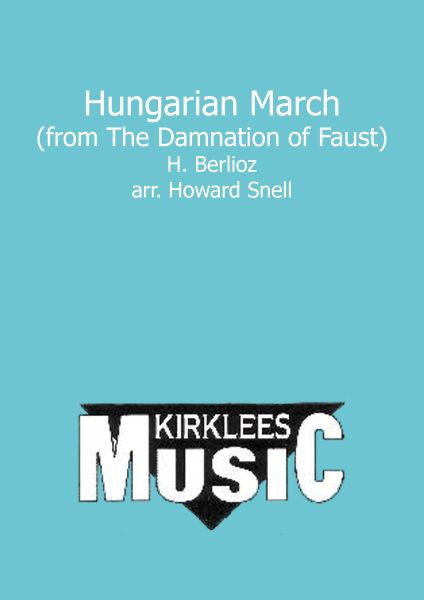Results
-
£34.50
Hungarian March Berlioz, H.
Estimated dispatch 7-14 working days
-
£24.95
HUNGARIAN MARCH (Brass Band Set) - Berlioz, arr. Phillip Catelinet
Estimated dispatch 7-14 working days
-
£36.00
Hungarian March (from The Damnation of Faust) - Berlioz, H.
Estimated dispatch 5-7 working days
-
 £34.50
£34.50 -
 £24.95
£24.95HUNGARIAN MARCH (Brass Band Set)
Estimated dispatch 7-14 working days
-
 £108.10
£108.10Hungarian March - Hector Berlioz
Estimated dispatch 5-14 working days
-
 £24.95
£24.95Hungarian March (Brass Band - Score and Parts)
Estimated dispatch 7-14 working days
-
 £34.50
£34.50Hungarian March (from The Damnation of Faust)
Estimated dispatch 7-14 working days
-
£61.00
Ungarsk marsj - Hector Berlioz - Bjorn Morten Kjaernes
The "Rakoczi March" (Hungarian March) was the unofficial state anthem of Hungary before Ferenc Kolcsey wrote the Himnusz which is today the official national anthem of Hungary.The first version of this march-song was probably created around 1730 by one or more anonymous composers, although tradition says that it was the favorite march of Francis Rakoczi II. That early version called back Francis Rakoczi II to save his people. It was very popular in the 18th century but in the 19th century the more refined Rakoczi March became prevalent.Hector Berlioz included the music in his composition "La Damnation de Faust" in 1846, and Franz Liszt wrote a number of arrangements, including his Hungarian Rhapsody No. 15, based on the theme. The march gave its name to a 1933 Austrian-Hungarian feature film - Rakoczy-Marsch This arrangement is based on Berlioz instrumentation and phrasing from his Hungarian March, but in the form of the 19th century Rakoczi March
Estimated dispatch 7-14 working days
-
 £82.30
£82.30Ungarsk marsj - Hector Berlioz
The "Rakoczi March" (Hungarian March) was the unofficial state anthem of Hungary before Ferenc Kolcsey wrote the Himnusz which is today the official national anthem of Hungary. The first version of this march-song was probably created around 1730 by one or more anonymous composers, although tradition says that it was the favorite march of Francis Rakoczi II. That early version called back Francis Rakoczi II to save his people. It was very popular in the 18th century but in the 19th century the more refined Rakoczi March became prevalent. Hector Berlioz included the music in his composition "La Damnation de Faust" in 1846, and Franz Liszt wrote a number of arrangements, includinghis Hungarian Rhapsody No. 15, based on the theme. The march gave its name to a 1933 Austrian-Hungarian feature film - Rakoczy-Marsch This arrangement is based on Berlioz instrumentation and phrasing from his Hungarian March, but in the form of the 19th century Rakoczi March
Estimated dispatch 5-14 working days
